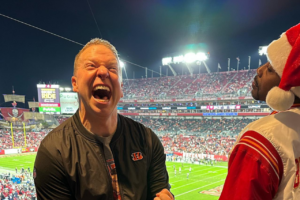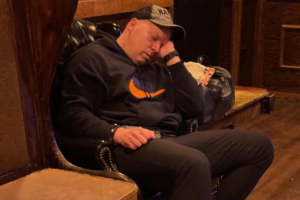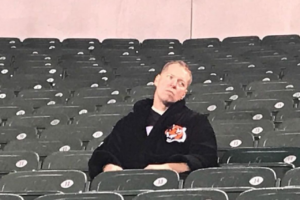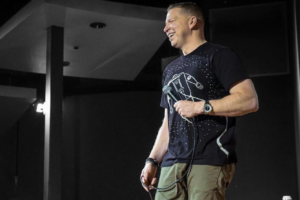In the landscape of American comedy, where authenticity often determines longevity, Gary Owen emerges as an intriguing paradox. His trajectory—from an Ohio trailer park to becoming BET’s first white host—reads like a reimagining of the American Dream, colored with unexpected cultural crossovers and genuine connections that challenge conventional narratives about race and entertainment.
Owen’s story begins in the stark reality of a three-bedroom trailer shared with five siblings, where early adversity served not as a limitation but as catalyst for transformation. “I had to get out,” he recalls with characteristic frankness, describing the pivotal moment when a high school friend literally pulled him from bed one Saturday morning to visit military recruiters. This seemingly simple act would alter the course of his life, leading him from the confines of his troubled home to the vast possibilities of the Navy and, eventually, to stages across America.
What sets Owen apart in the contemporary comedy landscape isn’t merely his background or his success, but rather his unique position as a cultural bridge-builder. In an era where discussions about race and identity often generate more heat than light, Owen has managed to create authentic connections across cultural lines without diminishing or appropriating the communities that have embraced him. His achievement as the first white host of BET’s Comic View wasn’t just a professional milestone; it represented a radical reimagining of what cultural integration could look like in American entertainment.
The comedian’s journey reflects a deeper truth about authentic cultural exchange in American society. Unlike many who might approach Black culture as tourists or opportunists, Owen’s connection runs deeper, stemming from genuine affinity and respect that began long before his comedy career. “I’ve always been most comfortable around Black people,” he notes without pretense, describing it not as a calculated choice but as a natural gravitation that shaped his personal life as much as his professional one.
Yet Owen’s story isn’t simply about crossing cultural lines; it’s about the complex ways in which identity, opportunity, and authenticity intersect in modern America. His experiences—from military service to marriage, from comedy clubs to major motion pictures—paint a portrait of an artist who has found success not by following a predetermined path, but by remaining true to his authentic self while building genuine connections across cultural boundaries.
In an entertainment industry often criticized for its superficial approach to diversity, Owen stands as a unique figure—neither a cultural tourist nor a revolutionary, but rather someone who has organically found his place in spaces where few would have expected him to belong. His journey challenges our preconceptions about cultural boundaries while highlighting the power of authentic connections in bridging America’s persistent racial divides.

This is not just the story of a comedian who found his audience; it’s a narrative that speaks to larger questions about identity, belonging, and the evolving nature of American culture in the 21st century. Through Owen’s lens, we glimpse a more nuanced understanding of how cultural boundaries can be transcended through genuine connection, respect, and shared experiences.
Gary Owen’s path, however, began in the unlikely setting of an Ohio trailer park, where necessity rather than ambition would shape his future trajectory in entertainment.
The three-bedroom trailer that housed Owen, his five siblings, and parents wasn’t just cramped quarters; it was a crucible that forged both resilience and an urgent desire for escape. Winter months meant crawling beneath the trailer’s skirting to wrap pipes with duct tape, a ritual of survival that painted a stark picture of working-class American life. “You got to keep the water running a little bit so it doesn’t freeze,” Owen recalls with the matter-of-fact tone of someone who learned life’s harder lessons early.
But it wasn’t just material hardship that defined Owen’s early years. His relationship with his stepfather cast a long shadow over his childhood, one that would later influence both his comedy and his approach to fatherhood. “My stepdad is literally one of the worst human beings on the planet,” Owen states, a rare moment where his characteristic humor gives way to raw honesty. This dynamic created an environment where escape wasn’t just desirable—it was necessary for survival.
Salvation arrived in an unexpected form: a friend who literally pulled Owen from his bed one Saturday morning to visit military recruiters. It was a moment that reads like a scene from a coming-of-age film, but for Owen, it represented a literal awakening to possibility. At seventeen, younger than most recruits, he made the strategic decision to join the Navy, beating his stepfather’s ultimatum to leave by his eighteenth birthday.
The military years proved transformative, though not in the traditional sense of discipline and structure. Instead, they provided Owen with his first real exposure to diverse perspectives and cultures. Stationed in Washington, D.C., he found himself in what was then known as “Chocolate City,” an environment that would profoundly influence his future in entertainment. It was during these years that Owen, unable to afford tickets to comedy shows, would stand outside venues just to hear the performers, absorbing the rhythm and flow of professional comedy through walls and doors.
His time in the Navy also introduced him to characters who would challenge his preconceptions. He recalls a bunkmate from South Carolina who shattered his urban-centric view of Black America by sharing photos of his family’s farm life. “I didn’t know Black people bailed hay,” Owen admits, a revelation that would later inform his ability to connect across cultural lines with authenticity rather than assumption.
The military provided more than just cultural education; it offered Owen his first real stage. While still serving, he won the title of “Funniest Serviceman in America,” a victory that suggested his future might lie beyond the Navy’s structured confines. These early performances, delivered in uniform to fellow service members, laid the groundwork for a career that would eventually break cultural barriers in unprecedented ways.

This period in Owen’s life—from the hardships of his trailer park upbringing to his years in the Navy—serves as more than just biographical background. It represents the forging of an authentic voice in comedy, one shaped by real experience rather than constructed persona. In an industry often criticized for superficiality, Owen’s military service and humble beginnings provided him with the raw material for a comedy style that would resonate across cultural boundaries, proving that sometimes the most unlikely beginnings can lead to the most remarkable destinations.
The path to comedic success rarely follows a conventional route, but Gary Owen’s entry into the world of stand-up comedy reads like a story that could only emerge from the particular complexity of American racial dynamics in the late 20th century. His journey from military serviceman to groundbreaking BET host illustrates both the porousness of cultural boundaries and the power of authentic connection in entertainment.
Owen’s first venture onto a comedy stage came at The Comedy Store in La Jolla, California—a venue that has launched countless careers in comedy. But unlike the carefully crafted first sets of many aspiring comedians, Owen’s debut was marked by the kind of raw authenticity that would later become his trademark. At just 20 years old, still active in the Navy, he approached the stage with the misguided confidence of youth, convinced that Los Angeles (which he believed encompassed the entire state of California) would immediately recognize his talent.
The reality proved more sobering. “They turned the lights off, the mic went off, and somebody grabbed me from the back of my shirt and rolled me to the front of the Comedy Store,” Owen recalls of his premature attempt to handle a heckler. It was the kind of humbling experience that either ends comedy careers or forges them in fire. For Owen, it proved to be the latter.
But it was his victory in the “Funniest Black Comedian in San Diego” contest that truly set him on his unprecedented path. The story itself feels like a comedy bit: Owen, hearing about the contest on radio station Z90, called in with “some bass in my voice,” careful neither to confirm nor deny his race. His subsequent win—and the audition for Comic View it earned him—would prove transformative not just for his career but for the landscape of American comedy itself.
The significance of Owen becoming the first white host of BET’s Comic View cannot be overstated. In an era when conversations about cultural appropriation and representation were less evolved but no less sensitive, Owen’s acceptance by Black audiences and industry figures represented something remarkable. His success wasn’t built on mimicry or appropriation but on genuine connection and respect for the culture that had embraced him.
Owen’s comedic evolution during this period reflected a delicate balance—maintaining his authentic voice while navigating cultural sensitivities with respect and understanding. “I don’t think it’s going to do anybody any good for me to like try to trash her,” he says of potential material about his ex-wife, demonstrating a maturity in his approach to comedy that extends beyond mere punchlines.
This period of Owen’s career challenges conventional narratives about race and entertainment in America. His success on BET wasn’t about colorblindness or cultural tourism; it was about genuine connection and authentic engagement with a community that recognized sincerity over superficiality. As Sommore, a previous Comic View host, told him, “It don’t matter who gets a job, they going to get hate… you being white makes it super easy to hate.”
The evolution of Owen’s comedic style during this breakthrough period reflected not just professional growth but a deeper understanding of cultural dynamics and human connection. His ability to navigate these waters while maintaining his authentic voice established a template for cross-cultural success in comedy that remains relevant today, suggesting that genuine respect and understanding can transcend traditional cultural boundaries in entertainment.
In the carefully stratified world of Hollywood, where success often follows predictable patterns, Gary Owen’s trajectory stands as a testament to the power of authentic connection and timing. His rise from stand-up stages to starring roles in major motion pictures illustrates both the evolution of American entertainment and the gradual dissolution of traditional cultural barriers in Hollywood.

Owen’s breakthrough role in “Think Like a Man” marked a pivotal moment not just in his career, but in the broader landscape of cross-cultural entertainment. As Bennett, Owen brought a natural authenticity to what could have been a token white character, earning praise from both audiences and his fellow cast members. “I think I was the first one to like sign on,” Owen recalls, noting how Will Packer, the film’s producer, specifically sought “a white guy that could hang out with black guys but not act black.”
The film’s success, and Owen’s chemistry with an ensemble cast including Kevin Hart, Michael Ealy, and Taraji P. Henson, demonstrated the potential for authentic cultural integration in mainstream entertainment. Cast member Jerry Ferrera perhaps best captured the film’s impact when he observed, “It was set up for Kevin to hit a home run; we just didn’t know how far he was going to hit it.”
Owen’s relationship with Kevin Hart exemplifies the kind of genuine industry connections that have marked his career. Their friendship, dating back to 1998 when Hart was known as “Little Kev” in New York, has evolved alongside their respective successes. Hart’s support during Owen’s public divorce—offering both legal advice and financial assistance—speaks to the authentic bonds Owen has formed within the industry. “Kev is just solid,” Owen reflects, highlighting how their relationship transcends mere professional courtesy.
His experience with Steve Harvey’s daytime talk show reveals the more complex aspects of Hollywood navigation. Initially brought on as a potential co-host, Owen found himself navigating the often-opaque politics of television production. The experience, which included being relegated to a “broke down closet with no mirror, no bathroom,” illustrates the less glamorous realities of the entertainment industry, even for established performers.
Throughout his career, Owen has maintained a delicate balance between mainstream success and cultural authenticity. His work spans traditional comedy specials, reality television (including his own show), and major motion pictures, yet he’s managed to maintain his distinctive voice and genuine connection with diverse audiences. This versatility is perhaps best exemplified by his ability to move seamlessly between projects like “Meet the Blacks,” where he worked alongside comedy legends like Mike Epps and Charlie Murphy, and more mainstream Hollywood productions.
The evolution of Owen’s career also reflects broader changes in the entertainment industry. As he notes, the rise of social media and digital platforms has democratized access to audiences, reducing the power of traditional “gatekeepers.” Yet Owen’s success predates this digital transformation, suggesting that authentic talent and genuine cultural connection can transcend even the most entrenched industry barriers.
His achievements stand as a blueprint for cross-cultural success in entertainment, demonstrating that authentic connection and respect for diverse audiences can create opportunities that transcend traditional industry categories. In an era where conversations about representation and cultural authenticity dominate entertainment discourse, Owen’s career offers insights into how genuine respect and understanding can build bridges across cultural divides while maintaining artistic integrity.
The intersection of public persona and private life often creates particularly complex narratives in entertainment, but Gary Owen’s personal journey reveals the raw, unvarnished reality behind the spotlight. His story of marriage, divorce, and family relationships unfolds not as a typical Hollywood tabloid saga, but as a deeply human chronicle of love, loss, and the ongoing quest for reconciliation.
Owen’s highly public divorce after 17 years of marriage became a master class in the modern complexity of personal crisis in the social media age. The process began conventionally enough—filing papers in a small Ohio town where “plumbers and waitresses divorce”—but quickly evolved into a public spectacle that tested both his professional resilience and personal fortitude. The subsequent period found Owen literally on the run, avoiding process servers while maintaining his comedy tour schedule, creating scenes that seemed pulled from a comedy script but carried very real stakes.
“I’m in Naples, Florida, I get off stage after the first show, I look at my phone, that’s when TMZ got a hold of it,” Owen recalls, describing the moment his private matter became public fodder. His response to this publicity—choosing silence over social media warfare—reflected a mature understanding of both digital dynamics and family relationships. “Social media isn’t real life,” he observes, a lesson learned through direct experience.
Perhaps the most poignant aspect of Owen’s personal narrative centers on his relationship with his children. The comedian’s voice carries tangible pain when discussing the current estrangement from his kids, describing them as “my greatest accomplishments and my greatest failure at the same time.” His efforts to maintain connection—from secretly watching his son at work to attempting to share Super Bowl tickets—paint a portrait of paternal love seeking expression against seemingly insurmountable barriers.
The parallels between Owen’s relationship with his own father and his current situation with his children add layers of complexity to his story. His father’s absence during his childhood, followed by attempts at connection once Owen achieved success, mirror current challenges with his own children. “I never realized it was my dad using me the whole time,” he reflects, demonstrating how personal history often cycles through generations despite our best intentions to break patterns.
Owen’s recent experiences with fatherhood, including welcoming twins, provide both redemption and challenge. The joy of new parenthood comes tempered with the awareness that his older children have no relationship with their new siblings, creating a bittersweet dynamic that reflects the complicated nature of modern family structures.
His perspectives on interracial dating and relationships offer particular insight into American cultural dynamics. Owen’s natural attraction to Black women, which he describes with the same matter-of-fact tone as discussing his comedy, reveals how authentic personal preference transcends social construction. “It’s like being gay,” he explains. “Gay guys know they’re gay… I just always liked Black women.”
Throughout these personal challenges, Owen maintains a remarkable balance between honesty and respect. Even when discussing his ex-wife, he consciously avoids excessive negativity, acknowledging shared responsibility for their marriage’s end while protecting their children’s memories of happier times. This approach demonstrates a maturity often lacking in public figures navigating personal crises.
The evolution of Owen’s personal life parallels larger American conversations about family, race, and identity. His experiences—from interracial marriage to public divorce, from fatherhood to estrangement—offer insights into how these dynamics play out in real time, with real consequences, beyond the theoretical discussions that often dominate public discourse.
In the complex landscape of American entertainment, where discussions of race and cultural authenticity often generate more heat than light, Gary Owen occupies a unique position that defies conventional categorization. His journey from Ohio trailer park to beloved figure in Black entertainment culture offers insights into the nuanced ways cultural boundaries can be navigated with authenticity and respect.
Owen’s acceptance in Black culture emerged not from calculated career moves but from genuine affinity and natural gravitation. “It’s like being gay,” he explains with characteristic directness. “Gay guys know they’re gay… I just always liked Black women.” This organic connection began long before his comedy career, shaped by early experiences that found him most comfortable in Black spaces and communities. His discovery of cultural differences proved enlightening rather than alienating, as evidenced by his Navy days when a Black bunkmate from South Carolina challenged his urban-centric assumptions about Black life in America.
The comedian’s cultural positioning raises interesting questions about authenticity in entertainment. Unlike many white performers who have attempted to cross cultural lines, Owen never adopted affected mannerisms or attempted to “act Black.” Instead, his success stems from genuine appreciation and respect for the culture that embraced him. This authenticity resonated particularly strongly during his historic tenure as the first white host of BET’s Comic View, a position that could have sparked controversy but instead cemented his unique place in Black entertainment.
Owen’s navigation of racial dynamics in comedy demonstrates remarkable sensitivity without sacrificing honesty. His material often addresses racial themes but does so from a place of shared experience rather than observation. “You’re going to find me at Magic City,” he notes, referencing the famous Atlanta strip club. “You ain’t going to find me at dollies.” These aren’t just punchlines but reflections of his lived experience, lending credibility to his cultural positioning.

The impact of Owen’s success extends beyond personal achievement. His career challenges conventional narratives about cultural appropriation and authenticity in entertainment. Rather than attempting to exploit or appropriate Black culture, Owen’s approach demonstrates how genuine respect and understanding can create meaningful cross-cultural connections. His experience suggests that cultural barriers in entertainment might be more permeable than commonly assumed, provided the crossing is attempted with sincerity and respect.
However, Owen’s position hasn’t been without its challenges. As he notes, “The internet’s not good for a relationship,” referring to how social media can amplify cultural tensions and misunderstandings. Yet his response to such challenges—maintaining authenticity while avoiding unnecessary controversy—provides a template for navigating cultural spaces with integrity.
Perhaps most significantly, Owen’s impact on entertainment culture suggests a more nuanced way of thinking about racial dynamics in America. His success demonstrates that authentic cultural connection can transcend racial categories without diminishing or disrespecting the cultures involved. In an era where conversations about cultural appropriation and authenticity often become polarized, Owen’s career offers evidence that genuine appreciation and respect can create meaningful bridges across cultural divides.
The lasting significance of Owen’s cultural impact lies not just in his individual success but in what it suggests about the possibility of authentic cross-cultural connection in American entertainment. His career demonstrates that while racial and cultural boundaries remain real and significant, they need not be insurmountable barriers to genuine connection and mutual understanding.
As the entertainment landscape continues its rapid evolution in the digital age, Gary Owen’s career trajectory and future aspirations offer insights into both the changing nature of comedy and the enduring power of authentic connection. His journey from traditional stand-up stages to contemporary platforms illustrates the industry’s transformation while highlighting the constants that remain essential to comedic success.
Owen’s perspective on the democratization of comedy through digital platforms reveals both opportunity and challenge. “We’re in a great age right now,” he observes, noting how platforms like YouTube, TikTok, and Facebook have diminished the power of traditional gatekeepers. This shift has particular resonance given his own experience navigating industry barriers, suggesting that future generations of comedians might find easier paths to their audiences.
However, Owen maintains a nuanced view of this digital transformation. While acknowledging the opportunities created by social media success, he draws important distinctions between different forms of comedic expression. “Doing a skit for like five minutes is entirely different than writing an entire set for 30, 45, an hour,” he notes, highlighting the sustained craftsmanship required for traditional stand-up comedy. This perspective reflects a deeper understanding of comedy as an art form rather than merely a vehicle for quick laughs.
His current aspirations reveal both professional ambition and personal growth. Owen’s dream role—a remake of Steve Martin’s “The Jerk”—speaks to his understanding of his unique position in American entertainment. The possibility of updating this classic tale of a white man raised in a Black family for contemporary audiences suggests both creative ambition and cultural awareness. “That’d be the dream role for me,” he says, “from my audience and how I live my life.”
The evolution of Owen’s approach to comedy reflects broader changes in entertainment culture. While maintaining his signature style, he demonstrates increasing awareness of cultural sensitivities without sacrificing authenticity. His careful navigation of controversial topics and personal stories suggests a maturity that could serve as a model for upcoming comedians dealing with similar challenges.
Perhaps most significantly, Owen’s ongoing influence in breaking cultural barriers continues to reshape perceptions of cross-cultural entertainment. His success has helped pave the way for more nuanced discussions about race and culture in comedy, demonstrating that authentic connection can transcend traditional boundaries without diminishing cultural specificity.
Looking toward the future, Owen’s goals extend beyond personal success to legacy-building. His careful consideration of how to present his new family life while working to reconcile with his older children reflects a deep understanding of the personal costs and responsibilities that come with public visibility. This balance between professional ambition and personal growth suggests a maturity that could influence how future entertainers navigate similar challenges.
The question of Owen’s ultimate legacy remains open, but his impact on American entertainment culture is already significant. By demonstrating how authentic cultural connection can create meaningful entertainment that transcends racial categories without disrespecting them, he has helped expand the possibilities for cross-cultural comedy in America. As the entertainment industry continues to evolve, Owen’s example suggests that genuine respect, understanding, and connection will remain essential elements of successful comedy, regardless of the platform or era.
Find people with high expectations and a low tolerance for excuses. They’ll have higher expectations for you than you have for yourself. Don’t flatter yourself that this has much to do with you – this is just who they are. Don’t look for “nice” in these relationships. Look for trust.
Be fearless in front of them with your


